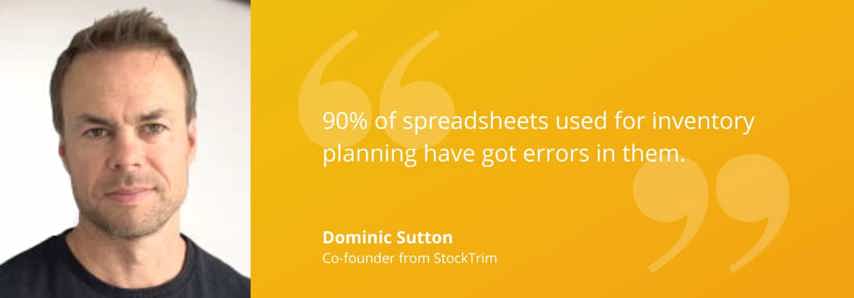
With economic conditions tightening product companies worldwide are focusing afresh on efficiencies and cost savings in their supply chains. For our latest Supply Chain Roundtable we asked four leading experts for advice on crafting a recession-ready supply chain strategy.
Meet our expert panel:
- Fatima Salhab: Portfolio CFO & eCommerce sector leader-from flinder – a smart finance functions and data analytics solution.
- Michael Von Euw: ex Operations Manager for Edinburgh Tea and Coffee and now MD of Kontroll Solutions – which provides inventory, financial & e-commerce consultancy.
- Dave Pickburn: CEO and Founder of Stream – logistics, vehicle and transport management software.
- Dominic Sutton: Co-founder at StockTrim – smart inventory forecasting software built for SMEs
Double down on the dollar
For businesses that sell internationally, Michael Von Euw recommends taking advantage of favourable exchange rates to build an overseas customer base. With the pound currently weak against the US dollar, North American customers will be aware they have more buying power and can provide much needed cashflow.
“They'll be aware that to them it's a savings and that can help you grow your market abroad at this point in time,” says Michael.
"We still have a very, very strong brand for anything made in the UK. So I would recommend if you have anything you export, then double down on it.”
Ensure you stay on top of Forex in a recession
Fatima Salhab agrees that agile exporters can find opportunities as exchange rates fluctuate – but adds that it’s doubly important to rationalise your business’ Forex strategy.
In the eCommerce space for example, some platforms will automatically adjust your selling price to reflect the current exchange rate – while others will allow you to set a rate of your choice.
When the pound drops against overseas currencies, keeping your selling price the same can give you a much-needed windfall – though it’s important to make sure your currencies are routed efficiently.

Fatima Salhab notes that a surprising number of businesses selling from the UK to the US will pay US suppliers from a GBP bank account, even though they’ve earned sales in US dollars that they could use.
“If you've got us customers paying in US dollars and you have US payments to make out, why are we not keeping those dollars in dollars? Just doing something very straightforward like that can make a massive difference.”
Stop relying on spreadsheets for cashflow-critical tasks
A common theme amongst all the panellists was the danger of relying on spreadsheets for cash-flow critical decision-making like purchasing.
“90% of spreadsheets used for planning have got errors in them. But a lot of SME businesses are still running their operations like this,” says Dominic Sutton.
“Some of them, they've got some sort of Taj Mahal spreadsheet that someone created a number of years ago. Maybe one person in the business still knows how to operate it, but that person may not always be with you or might go on holiday occasionally. And they're making formulas and, by proxy – making errors – on ordering. And it's costing you!”

Demand-plan with data
Data-based demand planning is an important part of ensuring your supply chain is recession-ready. It’s one thing to concentrate on the needs of making sales today, says Fatima, but it’s the customers you have in the future that you really need to plan for.
Cost-effective stocking becomes a lot easier with reliable data – and it gives you the ability to control the uncertain, adds Dominic.
Data from your accounting system offers hindsight. Your inventory management software offers insight – and an inventory forecasting tool unlocks foresight, he says.
“That's what we do with StockTrim. We just try to bring some planning into the equation and give you foresight that you can use to make decisions.
“And once you start making decisions and setting plans, you actually feel better. It's when you're sitting around twiddling your thumbs and going, ‘oh, this is terrible. What should we do?’ – that's when all the bad things happen.
“So you make a plan and get going. And I find, in my business, that makes everybody feel better and more cohesive about the way forward.”
Be brutally honest
Good data is one part of the equation, pragmatic decision making and honesty is the other, says Michael.
If you need to put your prices up, then do so – there’s no point keeping customers if it’s costing you money to sell to them, he says.

“You need to listen and put your ego aside,” he says.
“That can be as simple as looking at your inventory and being like, ‘Huh, this line that I thought was going to be the game changer – it’s not moving’.
“And that’s not because the client's not well informed. It's most likely they just don't want the product – and they don't see it the same way you do.”
Beware the rigidity of Sage
Tough times bring highlight all the flaws in a company’s systems, Michael points out. Which was something they learned while trading through the last currency crisis in the UK.
The last time the pound tanked was on the tail end of Brexit, says Michael. “And one of the biggest issues we had was that our coffee’s traded in dollars. So overnight our goods doubled in cost, but our inventory [in Sage] didn't change value. So that was the catalyst for moving from Sage to Unleashed.”
Good systems have a halo effect, which you need when times are tough
Using good modern system has a halo effect right through a company says Dave Pickburn. He gives the example of a company moving from a manual logistics approach to online tracking of deliveries.
“It used to be the customer rings the business partner, the business partner rings the person that's delivering it – maybe the wholesaler will ring the driver – maybe the driver will answer, or the driver will eventually ring them back....”

“It's this whole chain – and suddenly that's all gone and the customer's just getting a link and they can see where it is, which is what we all want.”
“So the customer services team just calms right down. And the cash flow improves – you don't associate planning your transport with cash flow improvement – but it does.”
It’s a general point that Michael Von Euw agrees with: When times are tough you need to make the most of tools that help your staff concentrate on what really matters to the business.
“Clear communication is one of your most powerful tools to minimise work, because then that also reduces the amount of complaints you get and the amount of times the customer needs hand holding.”
